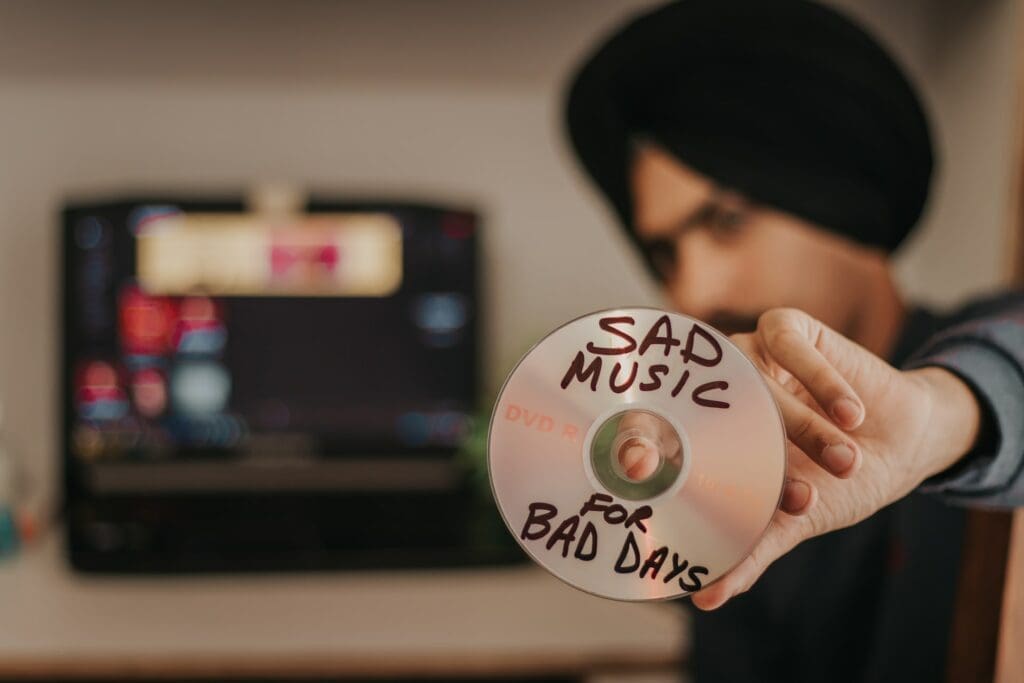There are thousands of books throughout the world purporting to help us become happier. The riddle of happiness has troubled philosophers and psychologists alike, and despite all the modern luxuries and scientific advancements over the last hundred years, it’s difficult to say that we’re really that much happier.
Matters become all the more confusing when we consider that we actively seek out music that is considered ‘sad.’ If we are so bent on avoiding this negative state, what draws us to sad music? Is that not counterintuitive?
There have been a number of theories exploring this conundrum, but no one conclusive argument has fought off the others. It is likely a combination of different factors, from personality to situation and circumstance, that draw us towards the music of a sombre character.

Individual Differences
We all have different tastes in music. Some like jazz, some pop, and others a healthy mix of death metal and symphonic speed metal. Sadness isn’t a genre, however, so can we say that some enjoy it while others don’t in the same way?
When researchers define emotions, there are two predominant axis: valence (positive or negative) and arousal (energetic or slow). Sadness occupies the lower rungs of both dimensions; anger is low valence and high arousal; excitement is high in both categories; calm is high valence and low arousal.
When researchers look at emotion in music, many factors come into consideration. Sadness comes through in the minor scale, low and drawn-out notes, and a slow tempo. That description mirrors the emotion scale described above—low and slow.
Most genres can manoeuvre between these dimensions. Taste in certain types of music doesn’t seem to preclude a taste in the emotions portrayed. Metal heads with no taste in pop might still enjoy a slower song with a higher valence—provided it still has distorted guitars of course.
That being said, sad music does seem to be preferred by people higher in measures of empathy and introversion. While this will lead to a greater number of sad songs populating an introvert’s playlists, a situation is likely a greater factor.
Is It Sad or Uplifting?
Perhaps sad music does not make us feel sad but helps us manage a sadness that has already befallen us. This was an idea of Aristotle’s. He believed sad music offered us cathartic value, washing away the grief.
There is also the idea of downward social comparison, which is the activity of looking at people less fortunate than us and feeling better for having done so. The hope is that our sadness will pale in comparison to that portrayed by a heartbroken singer.
Recently, music psychologist David Huron proposed that sad music prompts the release of the hormone prolactin in the brain. Prolactin is released by specific neurons in the hypothalamus in response to grief and sadness, helping to comfort and console us. In this scenario sad music becomes the friend with an arm over our shoulder, telling us all will be ok.
Sad About Nothing in Particular
Music is not the only medium whose sad form we enjoy. The Greeks were all about tragedies, we watch sad films, and look at sad paintings and photos. We do this not only when we’re sad, but also when we’re curious and in need of entertainment. These sad art forms are not there only to console or comfort us, but to provide aesthetic value.
In this idea of art, we find another important element. When we are sad, it is usually due to an incident that affects our lives. A loved one passed away, we missed out on some opportunities. However, when we listen to sad music or watch a sad movie, we are inducing these emotions without any change in our lives. We are aware that our imposed sadness has no base in reality.
Perhaps we find some enjoyment from this sadness because we know that it isn’t real in this important sense. We also enjoy fear when we ride a roller coaster and some anger in competitive sports in much the same way. We know that when all is said and done our lives are just as good as they were before.
All of these factors might play a role in our music choices. We use it to comfort us when we’re sad for some other reason; some of us are more inclined to listen to sad music, and we find aesthetic value in it when we know it’s a transient effect. Music is performing more than a single function within our lives, we call upon it in a variety of circumstances.










